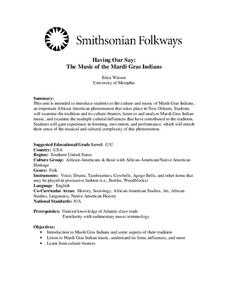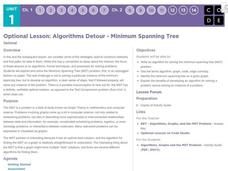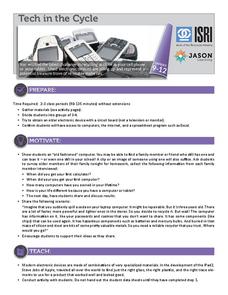Sundance
Teaching Strategies: The Giver
Can utopia be achieved? Included here are three literature worksheets to pair with Lois Lowry's The Giver. Pupils work in groups to come up with solutions to society's issues, individuals back up a statement related to a topic in the...
Curated OER
Minting New Thoughts
Consider a new metaphor when discussing positive thinking with your learners by having them "recycle" their negative, poison thoughts and "minting" them into positive ones using these dollar bill printables!
Dick Blick Art Materials
“Gawu” — African-influenced Tapestry
Here's a great way to combine environmental science with art. Kids use recycled materials to create their own Gawu, a tapestry made of discards. Although designed for special education classrooms, the activity is sure to engage all...
Dick Blick Art Materials
Matisse Prints du Soleil
The sun provides the link between this art and science activity. Kids use sunlight (or light from an artificial source) to produce heliographic prints on fabric or paper.
Dick Blick Art Materials
Chenille Stem Stitchery
The works of Spanish painter Joan Miro are used to inspire young artists to create their own colorful works of art using stitchery canvas and yarn. Kids draw their design on plastic canvas using erasable crayons and then stitch the...
Novelinks
The Book Thief: Concept Analysis
Designed for teachers who plan on using Markus Zusak's The Book Thief, this packet includes background information about the author, themes addressed in and issues raised by the novel, a list of research and project ideas, and...
Curated OER
Unit Plan for The Catcher in the Rye —A “Place-Based” Approach
"People never notice anything." As part of their study of The Catcher in the Rye, class members adopt Holden Caulfield's approach and spend time as quiet observers of their surrounding, recording their observations/reflections in a...
Exploratorium
Indicating Electrolysis
Sure, your learners know water is made up of two molecules, but watching them separate helps the class see the construction like never before. This resource provides directions on how to build a simple electrolysis device using a...
Charleston School District
Intro to Functions
How are functions related to chicken nuggets? A video teaches the concept of a function using the idea of a nugget-making machine as an analogy for a function machine. Learners determine if a relation is a function from an equation...
Charleston School District
Sketching a Piecewise Function
How do you combine linear and nonlinear functions? You piece them together! The lesson begins by analyzing given linear piecewise functions and then introduces nonlinear parts. Then the process is reversed to create graphs from given...
Smithsonian Institution
The Music of the Mardi Gras Indians
The traditions, costumes, and the music of the Mardi Gras Indians, African-Americans and those with African American or Native American Heritage are the focus of a unit that introduces class members to a little-known group that...
Code.org
Algorithms Detour - Minimum Spanning Tree
This optional lesson introduces the class to the idea of a minimum spanning tree. The activity focuses on determining an algorithm that will find the most efficient path in a network to transfer data.
West Contra Costa Unified School District
Polynomial Division
Multiply the ways your scholars can find the quotient with polynomial division. A lesson introduces polynomial division via long division, synthetic division, generic area model, and using the definition of division. Learners then...
Jason Learning
Tech in the Cycle
It might not be easy, but it is worth recycling electronics. Small groups determine the percentage of the materials that make up an iPad 2 and display the information in a circle graph. They then research the recycling process for...
Urbana School District
Fluids
In 1879, Sir William Crookes discovered the fourth state of matter, plasma. The presentation covers states of matter, phase changes, density, pressure Pascal's Principle, buoyant force, Archimedes' Principle, Bernoulli's Principle,...
West Contra Costa Unified School District
Polynomial Division
How do you apply the traditional division algorithm to polynomials? Here is an Algebra II lesson that extends the use of the division algorithm to polynomials. After establishing the concept of long division, synthetic division and the...
Teach Engineering
Where Are the Plastics Near Me? (Mapping the Data)
The last activity in a nine-part series has teams create a Google Earth map using the data they collected during a field trip. Using the map, groups analyze the results and make adjustments to the map to reflect their analysis. A short...
University of Colorado
The Jovian Basketball Hoop
A radio receives radio signals, converts them to an electrical signal, then converts this signal to a sound signal, and amplifies the sound so people can hear it. Class members use this information to create a short-wave radio antenna...
University of Colorado
The Jovian Basketball Hoop
Can you listen to Jupiter on a simple radio? Turns out the answer is yes! The resource instructs scholars to build a simple radio to pick up the radio waves created when the charged particles from the sun hit Jupiter's magnetic...
LABScI
Population Dynamics: The Predator-Prey Lab
Wolves eat better when the bunny population increases, but how long does that last? A series of 12 biology lessons uses the sixth installment to explore the predator-prey relationship between bunny and wolf populations. Young scientists...
National Institute of Open Schooling
General Characteristics of the p-Block Elements
The 20th installment in a series of 36 focuses on the characteristics of the p-block elements. Learners discuss, read about, and answer questions pertaining to the occurrence of these elements in nature, their electron configurations,...
PBS
Stories of Painkiller Addiction: Prescription Drug Abuse Awareness Campaign
The I-STOP law was designed to regulate the distribution and tracking of prescription drugs. After reading an article about its signing and implementation, middle and high schoolers work together to come up with their own ideas for an...
Quaver
Large Coffee Can Bongo
Want to make some music but you don't have the instruments? Get a start on your percussion section with a creative bongo drum project! Young musicians use a coffee can, packing tape, and colorful paper to create the perfect percussive...
PBS
Family History: Those with Lofty Ideals
Would you stand up for your beliefs, no matter the cost? Scholars investigate their own families to uncover examples of how and when someone stood up for their ideals. Using video clips, interviews, and eulogies, they come to understand...
Other popular searches
- Fashion Design
- Fashion Vocabulary
- Fashion Design Elements
- Fashion Shows
- Fashion Marketing
- Fashion History
- Fashion Illustration
- Fashion Cycle
- Clothing Design
- Fashion and Textiles
- 1950 to Present Fashion
- Fashion Merchandising

























